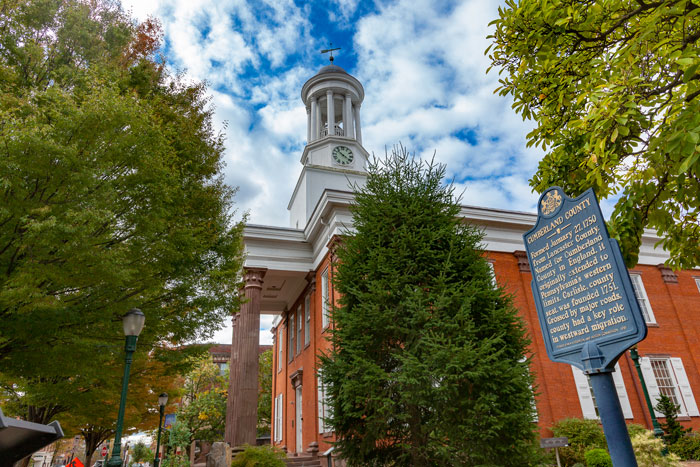Students Help Bring Carlisle and Cumberland County Climate Action Plans to Fruition

photo by Dan Loh.
Working through the Center for Sustainability Education, researchers examine and diagnose local greenhouse gas emissions and their effects
by Tony Moore
Back in 2019, the Carlisle borough joined 19 other Pennsylvania municipalities and a growing number of other governmental bodies committed to addressing climate change at the local level. Officials set out to create a climate action plan, which would detail ways the borough could ease greenhouse gas emissions and outline steps for implementing them.
The Carlisle effort sparked interest in the idea with Cumberland County officials, who launched a parallel research effort and approved a final plan a week after the borough did so. To assist in these major projects, the borough and county enlisted gas and electric utilities companies, the Carlisle Area School Board, Widener Law School and, of course, Dickinson.
Going local
Dickinson students, through internships with the Center for Sustainability Education (CSE), were matched with staff from the municipalities and trained on each component of the climate action planning process by representatives from the International Council for Local Environmental Initiatives USA, whose involvement was enabled via a grant from U.S. Department of Energy State Energy Program through the PA Department of Environmental Protection.
While climate change is a huge global issue, there are many sectors that municipalities can examine and address to mitigate local effects. The local climate action plans set out to address greenhouse gas emissions produced in the area from commercial and industrial buildings; residential buildings; waste, composting and recycling processes; water and wastewater management and transportation.
But before action could be taken in any of these areas, the groups had to see just what they were up against.
The results are in
“First, we had to assess how much greenhouse gas was emitted by each sector to understand the impact of each, to define solid goals,” says Raphael Lee ’22 (computer science), who worked on dissecting methane and nitrous oxide for the agriculture sector for the Cumberland County plan and gathered the notes of other communities undertaking similar research. “There was no previous compilation of greenhouse gas emissions for agriculture for Cumberland County.”
What they found around the county and the borough of Carlisle in the initial assessment probably won’t come as a huge surprise.
“Like most rural communities, residents of Cumberland County are extremely dependent on their cars,” says Sam Lavine ’22 (history), who worked on both plans and notes that the widespread reliance on cars not only greatly contributes to air and noise pollution, but rising gas prices also add to economic imbalances. “Among other things, the county’s climate action plan incorporates infrastructure improvements that include support for electric vehicles and multimodal transportation systems. These improvements will give residents more cheap and reliable transportation options and reduce local air and noise pollution.”
For Lee, “it was a fulfilling experience,” running data analysis and “learning the other side of working with data: corroborating from different sources, fact checking with professionals and directly communicating with what professionals—local farmers—thought about the Climate Action Plan. I was excited to not only get to work with real-life data but have the opportunity to collaborate with professors, policymakers and professionals.”
Positive legacy
Both the Carlisle Climate Action Plan and the Cumberland County Action Plan that resulted from the months of research take advantage of common-sense approaches and policies—actions that can reduce energy use and waste, create local jobs, improve air quality, preserve local landscape and history, reduce risk to people and property and benefit the area for years to come.
“I really enjoyed working on this project, because I felt like I was making a genuinely positive contribution to Cumberland County,” says Lavine, who credits the efforts of Carlisle Mayor Sean Shultz, Councilman Joel Hicks and CSE Director Neil Leary with helping pave the way for the borough’s climate action plan, while Leary and Kirk Stoner, director of Cumberland County's Planning Department, spearheaded that of the county. “Our work has always been intended to make our communities more sustainable, resilient to disruptions and equitable.”
Lavine was recently accepted into Columbia University’s Climate School, where he’ll advance his studies in climate action policies. And his path through Dickinson, CSE and the Climate Action Plan project led him right there.
“My internships with CSE have enabled me to enhance my studies by putting my education into action and working with local governments and civil society organizations to promote sustainability and social justice in my communities,” he says. “And this project has opened lots of doors for me. For much of my academic career, I’ve wanted to find ways to help other people. This project played a pivotal role in enabling me to do so. And I feel like I have left a positive legacy in Carlisle and Cumberland County.”
TAKE THE NEXT STEPS
Published May 5, 2022